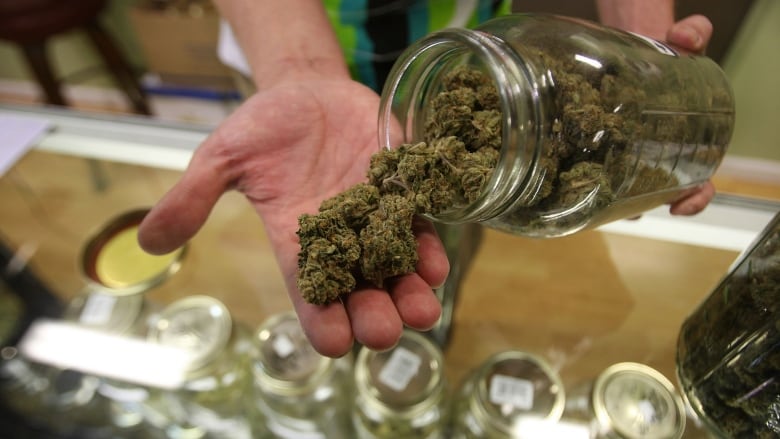In Nova Scotia, prepare to drive a long way for your pot
'The distribution model is extraordinarily limited,' says cannabis lobbyist and former premier Darrell Dexter

If you live in Liverpool on Nova Scotia's South Shore and want to buy cannabis at a store once it is legalized this summer, your best bet will be a three-hour round trip to either Halifax or Yarmouth.
You should also figure on a long drive if you live in Port Hawkesbury, Chéticamp, Kentville, Parrsboro and plenty of other communities with Nova Scotia Liquor Corp. outlets that won't be stocked with pot.
Many Nova Scotians, in fact, will find that buying cannabis in person is far more time consuming than what their counterparts will experience in the other Maritime provinces.
Nova Scotia, New Brunswick and P.E.I. have all decided that recreational pot will be sold through Crown corporations once legalization takes effect. They will all also offer home shipping.
Nine NSLC locations will stock cannabis, roughly one for every 106,000 Nova Scotians. By contrast, there will be one Cannabis NB store for every 38,000 New Brunswickers, the same ratio for government-owned P.E.I. stores.
In Nova Scotia, there will be two stores in Halifax and one in Amherst, Dartmouth, Lower Sackville, New Glasgow, Sydney River, Truro and Yarmouth.

Former Nova Scotia premier Darrell Dexter, who is now a cannabis lobbyist with Global Public Affairs, said Nova Scotia's retail sales model is less than perfect.
"It's fairly anemic in terms of its penetration into the market, the distribution model is extraordinarily limited," he said.
While Nova Scotians will be able to purchase cannabis from nine NSLC locations, they'll also be able to have it shipped to their home. NSLC spokesperson Beverley Ware said the price for shipping hasn't been worked out yet.
As per federal regulations, households in all three provinces will also be able to grow up to four cannabis plants.

Dexter said the approach Nova Scotia is taking will likely have little impact on illegal pot sales.
"The key point on doing battle with the black market is access," he said.
"The laws of economics will still apply, the best developed, lowest-cost supply chain will win and what you're dealing with now in Nova Scotia is a very well-developed, low cost and very effective supply chain, and they're not going to go away."
Nova Scotia Justice Minister Mark Furey said the black market won't disappear overnight in the province.
"We're not going to flip a switch on the 1st of July or the 1st of August and the illicit market disappears and everybody transitions to the legal retail market," he said.
How N.B., P.E.I. decided on store numbers
The thought process that went into deciding how many stores to open in each Maritime province differed considerably.
In New Brunswick, there will be 20 Cannabis NB locations that will serve the province, which has a population of about 760,000, almost 200,000 residents fewer than Nova Scotia. There will also be online sales and shipping.
"As we are entering an unchartered territory we had to use the best information available to us when making decisions on locations," Finance Department spokesperson Sarah Bustard wrote in a statement to CBC News.
"That is why the locations were based on population demographics (age, population), liquor sales transactions and traffic patterns. The locations were also chosen to ensure they are at least 300 m from schools and daycares."

In P.E.I., cannabis will be sold at four government-run stores, as well as online and with home delivery. The locations were chosen based on population density and proximity, Finance Department spokesperson Samantha Hughes said in an email to CBC News.
"This will allow the province to gauge sales across the province and plan for future expansion if needed," she said.
The connection between bottle-your-own wine and cannabis
Furey said a number of factors were looked at when deciding how many stores to open in Nova Scotia.
This included which NSLC stores had a bottle-your-wine service that could be phased out to accommodate cannabis sales. He said six of the nine NSLC locations chosen had been offering this service.
Once cannabis sales take effect, there will only be one NSLC store with bottle-your-wine service, in Bayers Lake.
Furey also said the legalization timeline given by the federal government was a factor in deciding how many stores to open.
"They have 4½ months to stand up nine retail stores and transition those facilities. That's the single biggest demand ever placed on Nova Scotia Liquor Corporation relative to infrastructure," said Furey.
Asked if population demographics and store sales factored into deciding where to open locations, he said he wasn't sure if that was part of the thought process.
He did say the large percentage of students in Halifax was in part behind the decision to open a standalone store on Clyde Street, which is a location that formerly housed an NSLC.
Furey said the decision to have nine stores wasn't simply a starting point. He said it would be premature to look at expanding the number until the province sees the uptake at stores versus home delivery. Otherwise, he said, the province might be forced to close locations if home delivery proves more popular.
Furey stands behind the decision to open nine stores.
"If we had done 20 stores, there would be communities and populations that weren't satisfied their community didn't get a store, so it would be an unreasonable expenditure of taxpayers money to simply establish these facilities without any business plan to determine their success," he said.